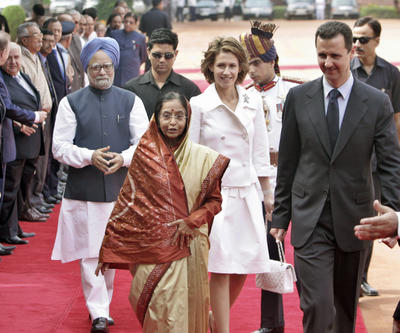This has been interpreted by some as a foreign policy shift to support the West, and by others as a sign of India’s emerging power on the world stage.
But India’s vote at the UNSC is largely consistent with the cautious stance it has maintained throughout the entire Syrian crisis. From the beginning, the Indian position on Syria has focused on three things: first, condemnation of all violence and human rights violations irrespective of who the perpetrators are; second, encouraging a peaceful and inclusive political process for the resolution of the current crisis; and third, ensuring that Syria itself leads the resolution, with the latter taking into account the aspirations of all Syrians and respecting the country’s sovereignty.
India’s first official statement on Syria at the UNSC in April 2011 embodied this balance, highlighting the ramifications of ‘prolonged instability’ in the country, but also drawing attention to the fact that both sides of the conflict have committed acts of violence. When India, Brazil and South Africa visited senior officials in Damascus in August 2011, New Delhi reaffirmed its commitment to Syria’s sovereignty, condemned violence from all sides and encouraged President Assad to end violence and introduce political reforms. This balance continued when India abstained from a UN Human Rights Council vote on Syria later that month, noting that finger-pointing was no substitute for constructive dialogue.
Even as the death toll climbed later in the year and it became clear the Assad regime had no intention of reforming, India abstained during a UNSC resolution in October 2011, resisting substantial Western pressure. In explaining his country’s vote, Hardeep Puri, India’s permanent representative to the UN, said the threat of sanctions did not accommodate New Delhi’s concerns and the resolution did not condemn the violence perpetrated by the Syrian opposition. The October resolution was subsequently vetoed by Russia and China.
Many see India’s decision to vote for the UNSC resolution this February, rather than abstaining, as signalling a dramatic departure from its habitual Syria policy. They cite various reasons, including the West’s increased pressure on New Delhi, the growing death toll in Syria and India’s growing realisation that its energy interests in the Gulf states ultimately matter more. Yet the facts suggest continuity rather than change in India’s position. As Indian officials repeatedly mentioned when explaining their vote, New Delhi only decided to support the resolution after its reservations regarding regime change, sanctions and military intervention were addressed and the resolution’s language was watered down. Far from bowing to Western pressure, India was part of a group of countries working to resist it. In fact, according to some accounts, the resolution was so weak that even Russia considered supporting it until the collapse of last minute talks with the US.
As if to confirm the consistency of the Indian position, Vinay Kumar, India’s acting permanent representative to the UN, reiterated New Delhi’s long-held policy on Syria on 13 February. He expressed concern over the present situation, condemning violence from all sides, and called for a peaceful and inclusive political process led by the Syrian people. Contrary to some who read India’s latest UNSC vote as an abandonment of the Assad regime or an alignment with Western positions on Syria, Kumar noted that India believed ‘the leadership of Syria is a matter for the Syrian people to decide’. India also attended the 70-member ‘Friends of Syria’ conference in Tunis as an observer soon after the UNSC vote.
While there remains a chance that India’s position on Syria will shift in the future, this seems doubtful at present. Much like its silence on other questions regarding the Arab Spring — from Libya to Bahrain to Egypt — India is trying to walk a tightrope and avoid taking bold stances. And while there may be many at home and abroad who wish that New Delhi were more assertive in its foreign policy, they should not be surprised if they continue to be disappointed, or fool themselves into seeing change where none exists.
Prashanth Parameswaran is a master’s candidate at the Fletcher School of Law and Diplomacy, Tufts University, and a freelance journalist. He blogs about Asian affairs at The Asianist, and you can also follow him on Twitter at @TheAsianist.


Or maybe India sees it from a perspective where it has no interest in supporting either side. My opinion on this matter is that both the sides are equally responsible in the blood-letting and that outside forces including USA,UK,Russia and China, are all equally involved, and are playing international politics on the issue. While India is a great supporter of democracy,it still recognizes that there may be other forms of governance and whatever be the form, it should be for the common good of its citizens;it is the right of the country to decide on its own. Sometimes the decision may not be possible at once on the table and some blood letting may be inevitable, but in due course the combination of both will lead to reform in which all sections of the public have a say.